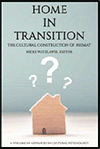
Home in Transition
The Cultural Construction of Heimat
Edited by:
Meike Watzlawik, Sigmund Freud Privat Universität
A volume in the series: Advances in Cultural Psychology: Constructing Human Development. Editor(s): Jaan Valsiner, Niels Bohr Professor of Cultural Psychology, Aalborg University.
Published 2023
This book presents an integrative perspective on home or Heimat showing that it is much more than the place we were born or where we live. This book brings fresh theoretical and empirical perspectives on what home is and can be from different viewpoints.
The chapters invite the reader to face challenging questions of what we learn about Heimat, when it is taken from us, threatened, left on purpose or when we set out on the journey to find one. The chapters are written by psychologists throughout, but are expanded in perspective by comments from the groups of people featured in the chapters, who are thus given their own voice. The book concludes with a suggestion on how to unite all the different perspectives within a general model rooted in cultural psychology.
All in all, the reader of this volume gains an access to the most complex phenomenon of human existence—that of home. Impossible to define in terms of the scientific lore of psychology, intuitively understandable in everyday life, and basis for deep desires if the feeling of home is lost.
This book will be a rewarding read for professionals and students from cultural psychology, cultural and psychological anthropology, sociology, and related disciplines, asking the question of what home is and how individuals can be supported in finding it.
CONTENTS
Series Editor’s Preface - “Feeling at Home Means Building Something”: Human Dignity In Liminal Settings, Jaan Valsiner. Acknowledgments. What Is Home? Facets of the German Construct Heimat and Insights on What Heimat Is, Roman Gallus. Commentary - Do We Need the Concept of Heimat at All? Home From the Perspectives of the “Others”, Lenssa Mohammed. Beyond Home: Indigenous Women Defend the Territorio-Tierra in Guatemala, Charlotta Sophie Sippel. Commentary: Women, Knowledge, and the Liberation of the Territory, Maria Bautista Hernandez. Homeless in One’s Homeland, Emma Weiler. Commentary: Grasping the Berlin Homeless Support System: A View From Within, Marta Felicja Reddemann and Svenja Ketelsen. Without a Home: Waiting in Refugee Camps, Ido Nahmias. Interview: “You Can Make Something Good Anywhere, If You Get the Opportunities.” Hussam Mashfez. Interview: “I Am Not a Number, I Am a Human Being, and I Have a Story” Mahmoud Almizel. Making Home: The Experiences of Volunteers in a Program for Befriending Refugees and Asylum Seekers in Germany, Anne Büttcher. Commentary: Challenges and Potentials in Mentorships: The Relevance of Close and Professional Support, Anna Stammnitz. What Is Home When It Is Never Permanent? The Meaning of Home for a Working Nomad in a Globalized World, Marieke Gattermann. Commentary: A Country as Anchor—But There Is Still More in the Cards, Thomas. Negotiating Home: Finding Home Between Two Countries, Simone Machado Braz. Conclusion: Home: From the Hypergeneralized to the Dimensional Level and Beyond, Meike Watzlawik. About the Contributors.
-
Paperback979-8-88730-326-0
Web price: $45.04 (Reg. 52.99)
-
Hardcover979-8-88730-327-7
Web price: $80.74 (Reg. 94.99)
- eBook979-8-88730-328-4

- PSY031000 - PSYCHOLOGY: Social Psychology
- SOC070000 - SOCIAL SCIENCE: Race & Ethnic Relations
- SOC050000 - SOCIAL SCIENCE: Social Classes
-
 Cultural Psychology of Intervention in the Globalized World
Cultural Psychology of Intervention in the Globalized World
-
 Culture, Work and Psychology
Invitations to Dialogue
Culture, Work and Psychology
Invitations to Dialogue
-
 Deep Loyalties
Values in Military Lives
Deep Loyalties
Values in Military Lives
-
 Drama of Multilingualism
Literature Review and Liberation
Drama of Multilingualism
Literature Review and Liberation
-
 From Dream to Action
Imagination and (Im)Possible Futures
From Dream to Action
Imagination and (Im)Possible Futures
-
 Making of Distinctions
Towards a Social Science of Inclusive Oppositions
Making of Distinctions
Towards a Social Science of Inclusive Oppositions
-
 Ornamented Lives
Ornamented Lives

